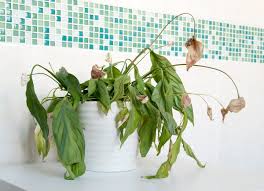
Urban gardening is gaining popularity across India as more people embrace the joy of growing plants in their homes, balconies, or terraces. However, maintaining a healthy garden can be challenging, especially when plants suddenly begin to wither and die. Various factors, specific to the Indian environment, contribute to this, but with a little knowledge and the right approach, you can often reverse the damage.
Here’s an overview of the common reasons plants may die and how to prevent or resolve these issues.
Overwatering and Underwatering
Watering is crucial to plant health, but too much or too little water can lead to serious problems. Overwatering, often the result of well-intentioned care, can suffocate plant roots, leading to root rot. The soil becomes waterlogged, depriving the roots of the oxygen they need to function properly. On the other hand, underwatering causes the plant to dehydrate, making the leaves turn yellow, wilt, or become crispy at the edges.
To maintain the right balance, always check the soil before watering. If the top inch feels dry, it’s time to water. Ensure your pots have adequate drainage to avoid water accumulation. In hot Indian cities, plants might need more frequent watering, but always consider the specific water needs of the plant.
For optimal soil health, use DeHaat Bageecha Super Soil, a nutrient-enriched potting mix that promotes healthy growth while ensuring proper drainage.
Nutrient Deficiencies
Plants need a variety of nutrients to thrive, and deficiencies in any of these can lead to poor growth or even death. In urban environments, soil quality is often compromised, lacking essential nutrients like nitrogen, potassium, magnesium, calcium, zinc, and iron.
Signs of nutrient deficiencies can manifest as yellowing leaves, stunted growth, or even curled or brittle leaves. For example, a lack of nitrogen results in yellow leaves, while magnesium deficiency causes discolouration and leaf drop.
To tackle this, soil testing is highly recommended. You can then supplement your plants with fertilizers specifically designed to replenish what is missing. DeHaat Bageecha Grotonic, a seaweed-based bio-stimulant, can help provide a balanced nutrient boost, ensuring your plants stay green and vibrant.
Over-Fertilization
Fertilizers help support plant growth, but too much of a good thing can turn toxic. Over-fertilization leads to a buildup of salts in the soil, which damages plant roots and causes leaf burn, yellowing, and eventually plant death.
The key here is moderation. Always stick to the recommended amounts of fertilizer, and every few months, flush the soil with water to remove excess salts. Opt for organic, slow-release formulas to avoid overwhelming your plants. Products like DeHaat Bageecha Super Soil offer controlled nutrient release, providing what your plants need without overloading the soil.
Pests
India’s warm and humid climate makes urban gardens vulnerable to a range of pests, from aphids and mealybugs to whiteflies and spider mites. These pests feed on your plants’ sap, weakening them and often spreading diseases in the process. Indoor plants, in particular, are more prone to infestations due to the lack of natural predators.
Keep a close eye on your plants by regularly inspecting leaves for signs of pests, such as discoloured patches, sticky residue, or tiny insects. Removing pests manually can help in the early stages, but for persistent problems, natural pest control solutions are essential.
DeHaat Bageecha Health 360, a 100% natural pest control spray, effectively combats a variety of pests without harming beneficial insects. It’s safe for use in indoor and outdoor spaces, ensuring your plants remain pest-free.
Fungal and Viral Diseases
Fungal infections like powdery mildew, leaf spots, and root rot are common in Indian gardens, particularly during the rainy season when high humidity levels promote fungal growth. These diseases cause leaves to turn yellow, wilt, or develop spots, often leading to plant death if left untreated. Viral infections, though less common, can also stunt plant growth and deform leaves.
The best way to prevent these diseases is to improve air circulation around your plants and ensure that the soil is not overly moist. Prune infected leaves immediately to prevent the spread of disease, and water your plants at the base to keep the foliage dry.
When fungal problems do arise, DeHaat Bageecha Fungiblock can help stop the infection within 72 hours. This botanical extract-based spray is a natural solution to fungal issues, ensuring that your plants bounce back to health.
Cold Stress
While most of India enjoys a warm climate, certain regions experience cold winters that can be detrimental to sensitive plants, especially those native to tropical climates. Sudden temperature drops or exposure to cold drafts can cause plants to wilt, turn yellow, or even die.
To protect your plants from cold stress, move them indoors during winter or cover them during cold nights. Avoid placing plants near doors or windows where they may be exposed to chilly air. Tropical plants, in particular, need protection from cold temperatures to thrive.
Sunlight Issues
Sunlight is essential for photosynthesis, but too much or too little can harm your plants. Inadequate light can cause pale, leggy growth, while too much direct sunlight can scorch leaves, especially during the harsh Indian summers.
Ensure that you understand the light requirements of each plant. Shade-loving plants should be placed in areas with indirect light while sun-loving plants need at least six hours of direct sunlight each day.
Conclusion
Urban gardening in India comes with its own set of challenges, but understanding what causes plant death and how to prevent it can make all the difference. From managing watering routines to ensuring proper nutrients and sunlight, these simple adjustments can help keep your plants thriving. For added support, DeHaat Bageecha offers a range of natural, plant-friendly solutions to help urban gardeners tackle everything from pest control to nutrient deficiencies.
With the right care, your urban garden will not only survive but flourish, providing you with a green oasis amidst the city’s hustle and bustle. Happy gardening!



